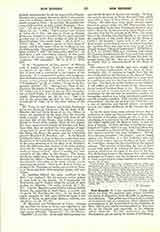

Non Expedit (It is not expedient).—Words with which the Holy See enjoined upon Italian Catholics the policy of abstention from the polls in parliamentary elections. This policy was adopted after a period of uncertainty and of controversy which followed the promulgation of the Constitution of the Kingdom of Italy (1861), and which was intensified by laws hostile to the Church and, especially, to the religious orders (1865-66). To this uncertainty the Holy Penitentiary put an end by its decree of February 29, 1868, in which, in the above words, it sanctioned the motto: “Neither elector nor elected”. Until then there had been in the Italian Parliament a few eminent representatives of Catholic interests—Vito d’Ondes Reggio, Augusto Conti, Cesare Cantu, and others. The principal motive of this decree was that the oath taken by deputies might be interpreted as an approval of the spoliation of the Holy See, as Pius IX declared in an audience of October 11, 1874. A practical reason for it, also, was that, in view of the electoral law of that day, by which the electorate was reduced to 650,000, and as the Government manipulated the elections to suit its own purposes, it would have been hopeless to attempt to prevent the passage of anti-Catholic laws. On the other hand, the masses seemed unprepared for parliamentary government, and as, in the greater portion of Italy (Parma, Modena, Tuscany, the Pontifical States, and the Kingdom of Naples), nearly all sincere Catholics were partizans of the dispossessed princes, they were liable to be denounced as enemies of Italy; they would also have been at variance with the Catholics of Piedmont and of the provinces wrested from Austria, and this division would have further weakened the Catholic Parliamentary group.
As might be expected, this measure did not meet with universal approval: the so-called Moderates accused the Catholics of failing in their duty to society and to their country. In 1882, the suffrage having been extended, Leo XIII took into serious consideration the partial abolition of the restrictions established by the Non Expedit, but nothing was actually done (cf. “Archiv fur kathol. Kirchenrecht”, 1904, p. 396). On the contrary, as many people came to the conclusion that the decree Non Expedit was not intended to be absolute, but was only an admonition made to apply upon one particular occasion, the Holy Office declared (December 30, 1886) that the rule in question implied a grave precept, and emphasis was given to this fact on several subsequent occasions (Letter of Leo XIII to the Cardinal Secretary of State, May 14, 1895; Congregation of Extraordinary Affairs, January 27, 1902; Pius X, Motu proprio, December 18, 1903). Later, Pius X, by his encyclical “Il fermo proposito” (June 11, 1905) modified the Non Expedit, declaring that, when there was question of preventing the election of a “subversive” candidate, the bishops could ask for a suspension of the rule, and invite the Catholics to hold themselves in readiness to go to the polls. (See Giacomo Margotti.)
U. BENIGNI

